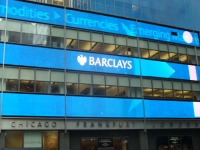Barclays Traders Jailed In Global Interest Rate Setting Scandal But Not Executives

The UK Serious Fraud Office has notched up another win in the global interest rate setting scandal by sending three Barclays traders to jail. Of the 20 bankers that have been charged to date, five have been found guilty, six have been let go while nine are to face trial.
But critics say that despite these wins, and over $9 billion in fines imposed on dozens of banks, the UK government has let the real culprits off the hook.
"A conspiracy theorist might suggest the establishment is closing ranks to prevent an elite from facing questions under oath," writes Mark Gilbert, author of "Complicit: How Greed and Collusion Made the Credit Crisis Unstoppable." "Even if that isn't the case, I can't escape the feeling that there still hasn't been anything like a proper reckoning of the Libor crisis -- leaving the distasteful suspicion that the junior troops are being court-martialed while the generals escape their day in court."
The scandal, which has unfolded over the last eight years, has shone a light into how banks set - and manipulate - global interest rates for $360 trillion in international deposits that are lent out every day. While most of these loans are overnight transfers between banks, they affect the price of consumer loans like mortgages, car loans and credit card loans.
Every day the British Bankers Association (BBA) would call up key bankers to ask them what rates they are offering. Based on these numbers, the BBA sets a global benchmark known as the London interbank offer rate (LIBOR), on which some 150 other international rates are based. But since these numbers are simply educated guesses by a few people who often know each other, they are easy to fix.
Electronic messages exchanged by Barclays traders suggested that for every 0.01 percent in up or down movement in interest rates, those involved could make "about a couple of million dollars."
The first UK banker to be put on trial was Tom Hayes, a former trader for Citigroup and UBS, who was sentenced to 11 years in jail last year. The second trial of six traders accused of helping Hayes fell apart this January resulting in a black eye for the regulators.
In the latest trial at Southwark crown court in London, four Barclays traders - Stelios Contogoulas, Jay Merchant, Alex Pabon and Ryan Reich - were accused of asking Barclays rate setters Jonathan Mathew and Peter Johnson to fix the numbers in a way that would help them profit.
The traders jailed in this latest trial were revealed to have exchanged messages that suggested that they were aware that the system could be manipulated. The government quoted one trader who said: "our deal has a big position, very much in favour of a crazy high Libor setting". A second said: "tomorrow's fix to be 4.07 minimum. 4.07, nothing less", while a third trader said: "We just need to f###### smash it. Have him set it low."
This week a jury declared two of the traders - Merchant and Pabon - guilty as well as Mathew, the rate submitter, and sentenced them to between two and six years in jail. The Serious Fraud Office was not, however, able to convince the jury that Contogoulas and Reich deliberately conspired to profit from the rate fixing. (The UK government plans to ask the court to schedule a second trial to see if another jury might convict them)
At the trial of the five Barclays traders, the Serious Fraud Office made it quite clear that it does not intend to aim higher in the bank's management ranks. "The banking industry isn't on trial, it is a handful of dishonest traders," James Hines, a prosecutor for the Serious Fraud Office told the court.
That's the core of the problem, says Mark Gilbert. He notes that Mark Dearlove, who was the bank's head of money markets told the court that he "accepts that he was involved in and aware of manipulation of Libor" has never been put on trial. Yet Dearlove was never put on trial. Now was his boss, Bob Diamond, the CEO of Barclays, who was let off the hook after the bank paid a $450 million fine.
But David Green, the director of the Serious Fraud Office, says they simply don't have enough evidence. "We looked in huge detail at certain behaviours by traders. Specific behaviour on specific dates. We considered it very long and hard and in great detail, had excellent legal advice on it and in the end I decided that the evidential threshold was simply not met," Green told the Daily Telegraph newspaper. "(People) are naturally disappointed, thinking something must have happened and why isn't someone doing something about it. Of course people are welcome to have their opinion. But they don't know."
- 185 Corruption



